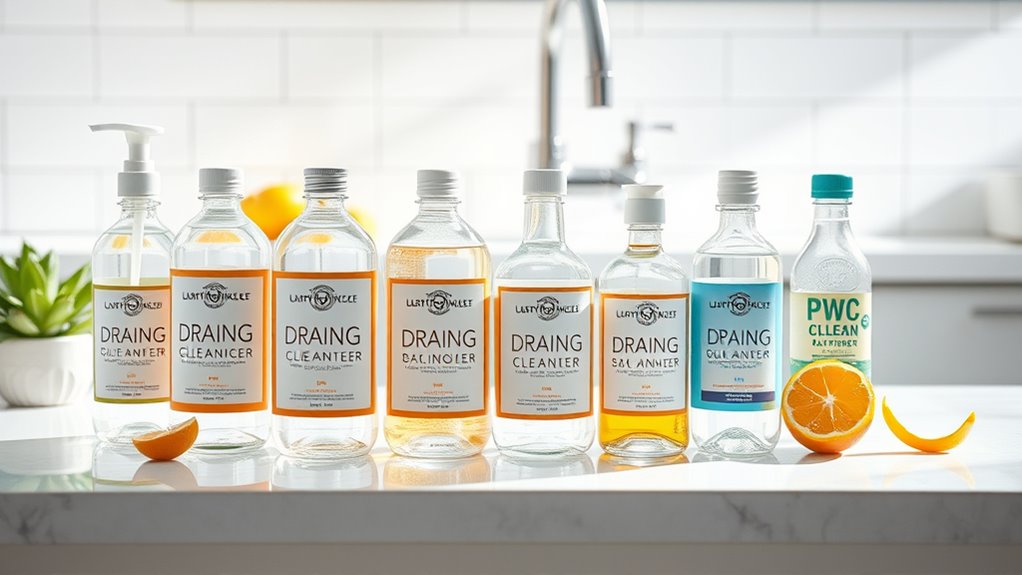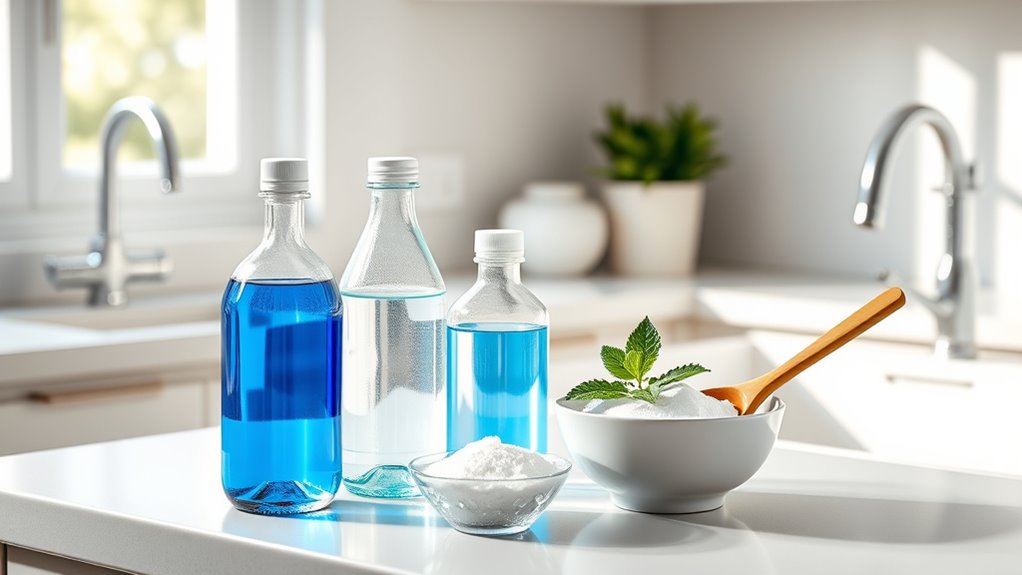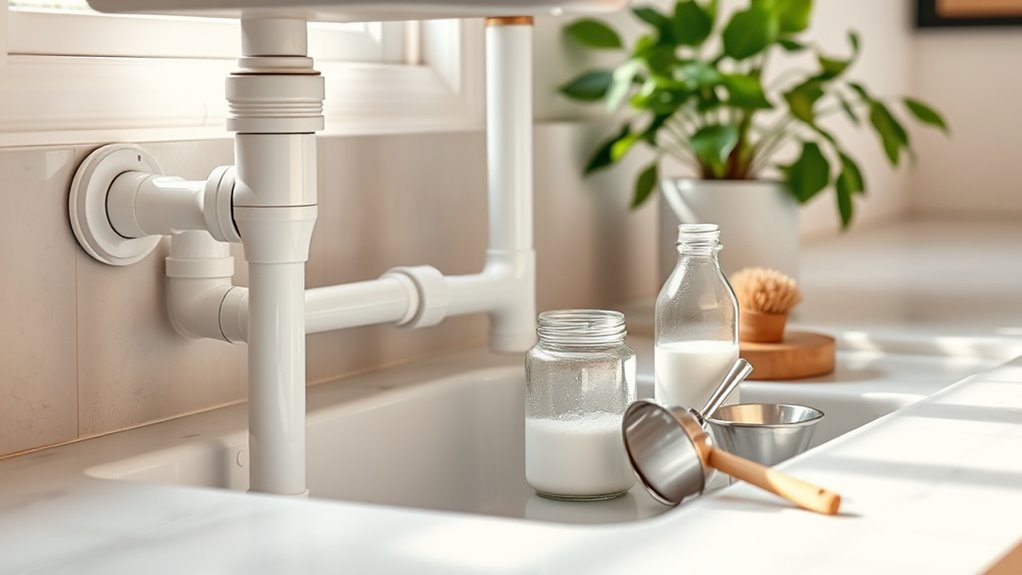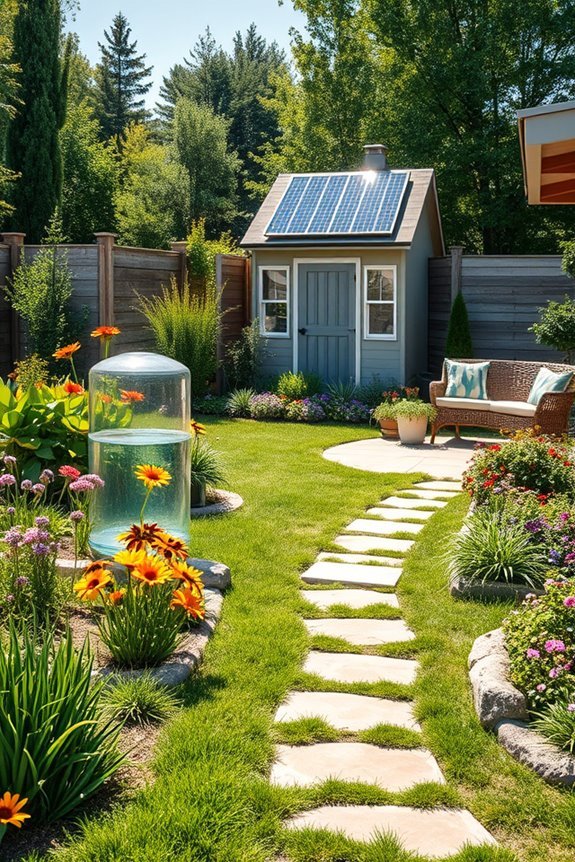What Drain Cleaner Is Safe for PVC Pipes? Recommended Products and Ingredients
If you’re searching for drain cleaners safe for PVC pipes, consider using enzymatic options or eco-friendly products with natural ingredients. Brands like BioClean and Green Gobbler offer effective formulas that won’t harm your plumbing. For regular maintenance, baking soda and vinegar are also safe and effective alternatives. Avoid harsh chemicals to protect your pipes. For more detailed information on safe ingredients and products, feel free to explore further.
Understanding PVC Pipes and Their Vulnerabilities

While PVC pipes are popular for their durability and corrosion resistance in plumbing, they do have vulnerabilities that can affect their performance.
Here are some key points to consider:
- Temperature Sensitivity: Extreme temperatures can cause PVC pipes to warp or become brittle, leading to potential damage.
- Sunlight Exposure: Prolonged exposure to sunlight can degrade PVC material, resulting in cracks and leaks.
- Chemical Damage: Certain harsh cleaners can compromise the integrity of PVC pipes, so it’s important to use appropriate cleaning products.
- Installation Issues: Improper installation can create structural weaknesses, increasing the risk of failure.
To ensure the longevity and functionality of PVC pipes, focus on proper care and maintenance, and be mindful of these vulnerabilities when using them in your plumbing systems.
Importance of Choosing the Right Drain Cleaner
Choosing the right drain cleaner is crucial for preserving PVC pipes.
It’s important to select products that are chemically compatible to avoid any damage.
Additionally, consider the environmental effects of the cleaner to ensure responsible usage.
Chemical Compatibility Considerations
When choosing a drain cleaner for PVC pipes, it’s crucial to ensure chemical compatibility to avoid damaging your plumbing.
Harsh chemicals found in many conventional drain cleaners can degrade PVC, leading to leaks or pipe failure.
Look for products specifically designed for PVC, as they contain milder ingredients that effectively clear clogs without harming your pipes.
Always check product labels and safety data sheets for compatibility information.
Environmental Impact Awareness
When selecting a drain cleaner, it’s crucial to consider its environmental impact. Many traditional drain cleaners contain harsh chemicals that can harm aquatic life and contaminate water sources. Opting for eco-friendly alternatives can effectively resolve plumbing issues while reducing your environmental footprint.
Here’s a quick comparison of different types of drain cleaners and their environmental effects:
| Type of Cleaner | Environmental Impact |
|---|---|
| Chemical Cleaners | Toxic to aquatic ecosystems |
| Enzymatic Cleaners | Biodegradable and less harmful |
| Natural Cleaners | Safe for the environment |
| Conventional Cleaners | High pollution potential |
Pipe Material Integrity
When dealing with PVC pipes, it’s essential to choose the right drain cleaner to avoid damage.
Harsh or abrasive cleaners can corrode and weaken these pipes, potentially leading to expensive repairs.
Look for products specifically designed for PVC, as they contain milder ingredients that effectively clear clogs without harming the material.
Common Ingredients in Drain Cleaners

When choosing a drain cleaner, it’s important to know the common ingredients and how they work, especially if you have PVC pipes.
Here are the key components to consider:
- Sodium Hydroxide: A powerful caustic that effectively breaks down organic materials, making it ideal for tough clogs.
- Sodium Hypochlorite: This chemical, found in bleach, helps disinfect and dissolve clogs but should be used carefully due to potential reactions with other substances.
- Enzymatic Cleaners: These biodegradable options use natural enzymes to break down organic waste, offering a safer, gentler alternative for regular maintenance.
Acid-Based Drain Cleaners: Risks to PVC Pipes
Using acid-based drain cleaners can seriously damage PVC pipes, which are common in homes.
These cleaners contain strong acids like sulfuric or hydrochloric acid that can corrode PVC over time, leading to leaks or even pipe failures.
The heat produced during the reaction can also weaken the pipes.
To avoid long-term issues, consider safer alternatives for clearing clogs that won’t harm your plumbing system.
Prioritizing these options will help maintain the integrity of your PVC pipes.
Caustic Drain Cleaners: What You Need to Know
Caustic drain cleaners contain strong alkaline chemicals that effectively dissolve organic clogs.
If you’re dealing with a clogged drain, understanding their chemical makeup and the necessary safety measures is crucial for safe application.
These cleaners are particularly effective on various clogs, including those in PVC pipes, but use them with caution to avoid potential damage.
Always follow the manufacturer’s instructions for safe and effective use.
Chemical Composition Overview
If you’re dealing with clogged pipes, it’s important to understand the chemical composition of caustic drain cleaners to use them safely.
Key ingredients include:
- Sodium Hydroxide: This powerful base effectively breaks down fats and grease.
- Potassium Hydroxide: Similar to sodium hydroxide, it helps emulsify clogs.
- Sodium Metasilicate: Enhances cleaning power and protects against corrosion.
While these chemicals can clear blockages, they can also damage plumbing systems and pose safety risks if misused.
Always read labels and follow instructions carefully to ensure safe and effective use.
Safety Precautions Required
When using drain cleaners, prioritize safety to prevent accidents and injuries.
Always wear protective gloves and goggles to protect your skin and eyes from potential splashes. Work in a well-ventilated area to avoid harmful fumes.
Never mix different types of cleaners, as this can cause dangerous chemical reactions. Follow the manufacturer’s instructions for application and disposal closely.
If the cleaner contacts your skin or eyes, rinse immediately with water and seek medical attention if irritation persists.
Effectiveness on Clogs
Caustic drain cleaners are effective for tackling a range of clogs, particularly those caused by organic materials like hair, grease, and soap scum.
If you’re experiencing frequent plumbing issues, these cleaners can be a good solution. Here are key factors to consider for optimal effectiveness:
- Type of Clog: Best for organic clogs; less effective on non-organic materials like plastic or metal.
- Concentration: Higher concentrations may work faster but can risk damaging plumbing if overused.
- Application Time: Allow the cleaner to sit as recommended to maximize its clog-dissolving ability.
Enzyme-Based Drain Cleaners: A Safer Option
Enzyme-based drain cleaners are a safe and effective option for maintaining PVC pipes. They use natural enzymes and bacteria to break down clogs caused by organic materials like hair, grease, and food particles.
Unlike traditional chemical cleaners, enzyme-based products are gentle on pipes, making them ideal for regular maintenance and safe for septic systems, homes with pets, and children.
Although they may take longer to clear clogs than stronger chemical alternatives, their safety and effectiveness make them a popular choice for homeowners looking to protect their plumbing.
Biodegradable Drain Cleaners: Eco-Friendly Choices
If you’re looking for eco-friendly solutions to maintain your PVC pipes, biodegradable drain cleaners are an excellent choice. These products utilize natural ingredients that break down easily, making them effective at clearing clogs without harming the environment.
Benefits of Biodegradable Drain Cleaners:
- Non-Toxic: Made from plant-based ingredients, they are safe for users and aquatic life.
- Environmentally Friendly: They don’t release harmful chemicals into water systems, fostering healthier ecosystems.
- Safe for PVC: Specifically formulated to protect your pipes from damage.
Choosing biodegradable drain cleaners helps you maintain your plumbing while also supporting a cleaner planet.
Recommended Brands for Safe Drain Cleaning
If you’re looking for safe and effective drain cleaning solutions for PVC pipes, consider these recommended brands:
- BioClean – Utilizes natural enzymes to break down organic clogs without harming your plumbing.
- Green Gobbler – An eco-friendly formula safe for all pipe types, including PVC.
- Drano – Offers a specialized product for PVC that clears clogs while being gentle on pipes.
- Earth Friendly Products – Provides a plant-based drain cleaner that is effective and safe for home use.
- Fizzion – Features unique cleaning tablets that create a powerful solution with water, without harsh chemicals.
These brands focus on safety and effectiveness for your drain cleaning needs.
How to Use Drain Cleaners Safely on PVC Pipes
How to Safely Use Drain Cleaners on PVC Pipes
If you’re facing a clogged drain and considering using a drain cleaner on your PVC pipes, follow these key safety tips to ensure effective use while protecting your plumbing system.
- Select the Right Product: Opt for a drain cleaner specifically designed for PVC pipes. This reduces the risk of damaging the pipes through harmful chemical reactions.
- Follow Instructions: Always adhere to the manufacturer’s instructions for application and dosage. Overusing the product can lead to pipe damage.
- Wear Protective Gear: Equip yourself with gloves and eye protection to prevent chemical splashes during the cleaning process.
Alternative Methods for Unclogging Drains

If you’re dealing with a clogged drain, consider these effective, chemical-free methods to restore flow:
- Baking Soda and Vinegar: Pour half a cup of baking soda followed by half a cup of vinegar down the drain. Let it sit for 30 minutes, then flush with hot water.
- Hot Water Flush: Simply boiling water can help dissolve grease and soap build-up. Gradually pour it down the drain in stages, allowing it to work through the blockage.
- Plunger: A classic tool for unclogging drains. Make sure there’s enough water in the sink to cover the plunger, then use firm, even strokes to create suction and dislodge the clog.
These methods are simple and effective for clearing blockages in PVC pipes without resorting to harsh chemicals.
Baking Soda and Vinegar
If you’re looking for a natural and effective way to unclog your drains, baking soda and vinegar can be a great solution.
This method is eco-friendly and avoids harsh chemicals. Here’s a quick guide:
- Pour: Add half a cup of baking soda into the drain.
- Add: Follow with half a cup of vinegar to create a fizzing reaction that helps break down clogs.
- Wait: Let it sit for about 30 minutes, then flush with hot water.
This simple process can clear minor blockages and maintain your plumbing without damaging PVC pipes.
Hot Water Flush
For those looking to unclog drains effectively, a hot water flush is a simple and efficient option.
To perform this method, boil water and pour it slowly down the drain. The heat helps dissolve grease, soap scum, and debris causing blockages.
Ensure the water is just below boiling to avoid damaging PVC pipes. For enhanced results, consider adding baking soda to the hot water.
Regularly using this technique can help maintain clear drains and prevent future clogs, making it a practical preventive measure.
Plunger Techniques
Plunger techniques are essential for effectively unclogging minor drain blockages without relying on harsh chemicals. Here’s a quick guide for using a plunger successfully:
- Seal the Overflow: For sinks, cover the overflow hole with a wet cloth to enhance suction.
- Position the Plunger: Ensure the rubber cup fully covers the drain opening to create a strong seal.
- Pump Vigorously: Push down and pull up with controlled force for about 15-20 seconds.
DIY Drain Cleaning Solutions for PVC Pipes
If you’re looking for effective DIY drain cleaning solutions for PVC pipes, here are some simple methods to tackle clogs without harsh chemicals.
- Baking Soda and Vinegar: Pour half a cup of baking soda followed by half a cup of vinegar into the drain. Allow it to sit for 30 minutes, then rinse with hot water. This combination creates a fizzing reaction that helps break down debris.
- Boiling Water: Pouring boiling water down the drain can help dissolve grease buildup that may be causing clogs.
- Wet/Dry Vacuum: For more stubborn blockages, a wet/dry vacuum can effectively suction out debris.
These eco-friendly methods can help keep your PVC pipes clear while maintaining their integrity.
When to Call a Professional Plumber
When should you call a professional plumber for drain issues? Here are key situations to consider:
- Persistent Clogs: If your drain remains clogged after multiple attempts to clear it, a deeper obstruction may exist that requires specialized tools.
- Recurring Problems: Frequent clogs or slow drainage often indicate underlying plumbing issues that need a professional’s assessment and repair.
- Unusual Sounds or Smells: Gurgling noises or unpleasant odors from your drains can signal serious blockages or leaks, best handled by an expert.
Addressing these issues promptly can help prevent costly repairs and ensure your plumbing system functions efficiently.
Preventative Measures for Clogged Drains
To prevent clogged drains, homeowners can take several effective measures. Here are key steps to maintain clear plumbing:
- Use Drain Screens: Install screens over drains to catch debris and prevent buildup.
- Dispose of Waste Properly: Avoid pouring grease, coffee grounds, or food scraps down the drain. Use trash bins for disposal instead.
- Regular Cleaning: Clean sink traps regularly to remove accumulated debris.
- Flush Drains Periodically: Use hot water or a vinegar and baking soda solution to flush drains and keep pipes clear.
- Schedule Inspections: Have a plumbing professional conduct routine inspections to detect potential issues early.
Signs of PVC Pipe Damage From Drain Cleaners
Identifying signs of damage in PVC pipes is crucial for effective plumbing maintenance.
Key indicators include:
- Leaks: Visible water around joints or fittings may indicate a compromised pipe.
- Cracks: Look for any visible cracks on the surface of the pipes.
- Unusual Odors: Foul smells can signal chemical reactions caused by drain cleaners.
Recognizing these signs early can help you take preventative measures and maintain your plumbing system effectively.
Common Damage Indicators
Homeowners often miss the signs of damage caused by harsh drain cleaners on PVC pipes.
It’s crucial to identify these indicators to protect your plumbing system. Here are the key signs to look for:
- Visible Cracks: Small fractures on PVC pipe surfaces can indicate chemical damage.
- Discoloration: Yellowing or darkening of pipes suggests deterioration from harsh chemicals.
- Leaking Joints: Increased moisture around pipe joints may signal compromised seals.
Address these issues quickly to avoid costly repairs and ensure you use safe drain cleaning products.
Chemical Reactions Explained
Using harsh drain cleaners can severely weaken PVC pipes due to the strong acids or bases they contain.
These chemicals cause the PVC material to deteriorate over time, leading to issues like thinning walls and leaks. The heat generated during these chemical reactions can further damage the pipes.
Signs of damage include discoloration, warping, or brittleness, indicating that the pipes may no longer handle normal water pressure.
To avoid costly plumbing repairs, it’s crucial to choose appropriate cleaners that won’t harm your pipes.
Preventative Maintenance Tips
To ensure the longevity of your PVC pipes, it’s crucial to identify signs of damage caused by drain cleaners.
Here are key indicators to watch for:
- Discoloration: Look for unusual yellowing or darkening, which can suggest chemical corrosion.
- Cracks or Fractures: Visible cracks or splits indicate weakened pipe integrity, often from harsh cleaning agents.
- Leaking: Check for leaks around joints or connections, as these may result from compromised seals due to chemical exposure.
Stay vigilant to maintain your plumbing system effectively.
Best Practices for Maintaining PVC Pipe Health
To ensure the longevity and efficiency of your PVC pipes, follow these essential maintenance practices:
- Inspect for Leaks: Check your pipes monthly for any signs of wear or leaks. Addressing issues promptly can prevent costly water damage.
- Flush Your Pipes: Every three months, flush your plumbing system with water to eliminate debris and reduce the risk of clogs.
- Clean Strainers: Monthly cleaning of strainers in sinks and showers will help prevent the buildup of hair and food particles, improving water flow.
Conclusion
When selecting a drain cleaner for PVC pipes, it’s essential to choose products that are safe and effective. Harsh chemicals can damage PVC, leading to costly repairs. Look for drain cleaners that contain enzymes or natural ingredients, as these are typically safe for PVC.
Some recommended products include:
- Enzyme-based cleaners: These break down organic material without harming pipes.
- Baking soda and vinegar: A natural alternative that can effectively clear minor clogs.
- Biodegradable cleaners: These often use plant-based ingredients that are safe for plumbing.
Regular maintenance and preventive measures can help keep your drains clear and your PVC pipes in good condition.


